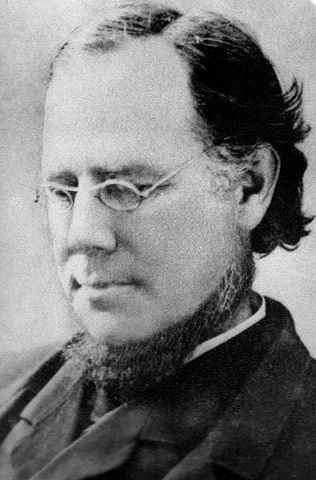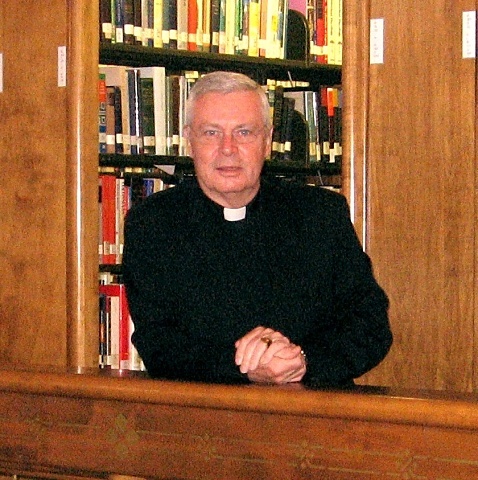December 18, 2012
This is the thirty-fifth in a series of previously unpublished reflections from the 1854 spiritual notebook of Paulist Founder, Servant of God Father Isaac T. Hecker. The reflection series is being made public in conjunction with Father Hecker’s cause for canonization. Father Paul Robichaud, CSP, Paulist historian and postulator of Father Hecker’s cause, is coordinating the materials and offers a response to each entry.
Introduction to Part I by Father Paul Robichaud, CSP
In the great mystery of the Incarnation, the Word of God became flesh and dwelt among us. For Father Hecker, God had already attempted to instruct humankind about God’s presence in our world but without success. As Father Hecker notes, humankind worshipped everything as God except God. So God became visible in Jesus Christ. Humankind had made themselves into Gods, so the Creator sent His Word, His Son in human form, using our anthropromorphic bias (imposing onto God the belief that we humans are God) our sense of ourselves as God. We do it to flatter and blind ourselves but God uses this weakness in us, so that human to human, we might know the true God through the person of Jesus.

Before the birth of Christ, the world worshiped everything as God except God.
They might have known God from the reflection of primitive revelation, which all nations to a greater or lesser degree had received. The might have known God from the light of reason. They might have known God from creation, for “the heavens declare the glory of God.” But men had lost the knowledge of God in a world filled with idolatry and sin.
How will God restore the knowledge of Himself? Will God infuse into the minds of men a new light? But this is what humankind had once possessed and had lost. God took a new course. Men worshipped statues in the form of man in contempt of the Creator and so God became man to regain the homage which alone God was due. Humankind was incapable to understand the invisible so God became incarnate. Verbum caro factum est (The word was made flesh). God rendered Himself visible, appeared to men’s eyes and instructed them through their senses. By the birth of Christ, the knowledge of God was restored to man and in a much greater degree than what man had lost.
A little Christian child who knows his catechism could instruct the greatest of the ancient philosophers, A Socrates, a Plato or a Cicero concerning God and man’s destiny; and how to attain it; the knowledge which they labored in vain. O cave of Bethlehem, you are the school of divine wisdom! O holy crib you are the chair of divine truth! O infant God, you are the source of ineffable light!

Servant of God Father Isaac Hecker preached this sermon at the Paulist’s Church of St. Paul the Apostle in New York City on Christmas morning in 1870. At this time Father Hecker was in the most effective periods of his ministry and a year away from developing symptoms of leukemia that would drain him of his energy. During the previous five years he had built up Catholic publishing in America; completed a successful tour of lyceums in the country lecturing on American Catholic identity to mixed audiences of Protestants and Catholics; addressed the bishops at the Second Council of Baltimore; and attended the opening of the First Council of the Vatican. Finally, Hecker saw mission preaching restored; a work that had been temporarily put on hold since 1865. He had a broader perspective on the Church and was highly optimistic about his role and that of the Paulists in the Church of the 1870s.
Hecker’s Christmas Sermon is divided into three parts, each with a short introduction. In Part One, we learn that Christ came at Christmas in order to be known. In Part Two, we learn that Christ came at Christmas in order to be loved. Finally in Part Three, we learn that to a world scared by war, Christ came to bring peace. In a period when America was in healing following the Civil War, it contexts the message of his sermon. Over the next three weeks we will present the different parts of the sermon. To our readers we wish you an Advent filled with light and a Christmas filled with hope.
About Father Isaac Hecker’s 1854 Spiritual Notebook
Servant of God, Father Isaac Hecker wrote these spiritual notes as a young Redemptorist priest about 1854 and they have never been published. Hecker was 34 years old at the time, and had been ordained a priest for five years. He loved his work as a Catholic evangelist. The Redemptorist mission band had expanded out of the New York state area to the south and west, and the band’s national reputation grew. Hecker had begun to focus his attention on Protestants who came out to hear them. To this purpose Hecker began to write in 1854 his invitation to Protestant America to consider the Catholic Church, “Questions of the Soul” which would make him a national figure in the American church.
Hecker collected and organized these notes that include writings and stories from St. Alphonsus Liguori, the Jesuit spiritual writer Louis Lallemant and his disciple Jean Surin, the German mystic John Tauler, St. Thomas Aquinas and St. Jane de Chantal among others. These notes were a resource for retreat work and spiritual direction and show Hecker’s growing proficiency in traditional Catholic spirituality some ten years after his conversion to the Catholic faith. They are composed of short thematic reflections.